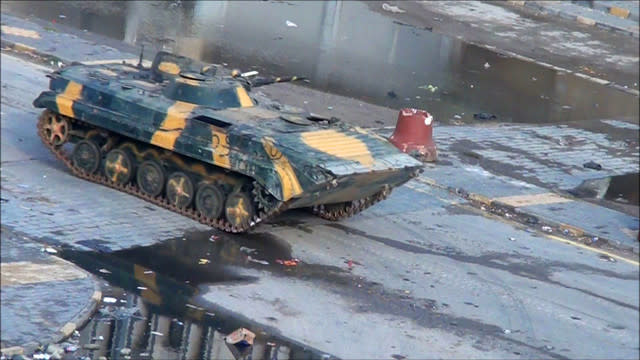 The Envoy
The EnvoySyria opposition activist calls for international intervention to halt carnage

A prominent U.S.-based Syrian opposition activist living in exile from the Bashar al-Assad regime called for humanitarian intervention in Syria in an interview Tuesday .
Radwan Ziadeh, a visiting scholar at Harvard University and a member of the main Syrian opposition bloc, the Syrian National Council, told Yahoo News Tuesday that the Arab League monitoring mission getting under way in the country does not have the capacity or experience to stop the carnage that has beset the Arab nation since anti-government protests began there in March.
"What's needed is international intervention," Ziadeh explained via telephone. "We need a buffer zone along the Turkish borders where the situation is still escalating. Maybe the UN has to declare some 'safe cities.'"
The dissident's call for international military intervention marks a shift in thinking within Syria's increasingly united but embattled pro-democracy movement; in an interview with Yahoo News in August, Ziadeh said that "none of the Syrian opposition is calling for military intervention." The veteran human rights activist and scholar contended at the time that the Syrian people had "discovered their power to change the regime without [international] intervention."
But as Ziadeh and others now call for humanitarian intervention as the struggle to oust Assad drags on into its ninth month, they're hard pressed to find robust support in the international community.
Ziadeh spoke as Arab League monitors toured the city of Homs Tuesday. The first 50 Arab League monitors arrived in the Syrian capital of Damascus on Monday, with another 100 slated to arrive shortly.
"Even on [the Arab League monitoring mission's] first day, 37 people have been killed," Ziadeh said. "There were killings yesterday, there were killings today, and there will be more killings tomorrow."
Given that the Arab League has never before undertaken such a mission, Ziadeh said, "we understand they have some difficulties in their capacities—they don't have enough training and they don't have the knowledge of the situation in Syria."
Ziadeh urged international humanitarian action to protect civilians in Syria--even if the UN Security Council fails to endorse such action. The United States and European countries have been pressing Russia and China--key veto-wielding Security Council members--to reverse their opposition to a resolution condemning Assad for the carnage. The UN said this month that more than 5,000 people have been killed in the regime's crackdown on the unrest.
Moscow this month distributed its own draft resolution condemning violence in the country, while explicitly ruling out a Libya-style international military intervention. However, UN envoy Susan Rice last week accused her Russian counterpart of then stalling UN Security Council discussion of Syria at a meeting ahead of the Christmas holiday.
But Russia is not the only hold-up, Ziadeh noted. Even countries that have condemned Assad--the United States, France and Turkey, among them--have not yet come to consensus on further action. Among the reasons, Ziadeh said: the recent unraveling of relations between France and Turkey, after France passed a law this month making it a crime to deny the Ottoman-era Armenian genocide.
Meanwhile, though the government of Turkish Prime Minister Recep Tayyip Erdogan has used increasingly harsh language to denounce the Assad regime—a former ally--and announced sanctions against Assad, Ankara would be averse to any internationally-imposed military buffer zone in Syria without a UN resolution authorizing it, Ziadeh said.
The Obama administration has also been hesitant to endorse Libya-style military intervention in Syria, said Ziadeh. He was among a group of Syrian pro-democracy activists who met with Secretary of State Hillary Clinton in August.
"I don't see the U.S. taking any action since last September when they embarked on their last round of sanctions," he said. "After that, only statements have come out, without taking any action. ... They don't want international intervention in Syria because they don't know where it would lead."
The State Department said Tuesday, however, it is continuing to consult with international allies about next steps. "If the Syrian regime continues to resist and disregard Arab League efforts, the international community will consider other means to protect Syrian civilians," State Department spokesman Mark Toner said in a press statement Tuesday.
Even as Ziadeh was pessimistic about whether the Arab League mission could halt the violence, he did recently receive good news from his family in Syria. His brother, who was arrested by Syrian Air Force security forces in August, was released three weeks ago.
Other popular Yahoo! News stories:
Want more of our best national security stories? Visit The Envoy or connect with us on Facebook and on Twitter.

